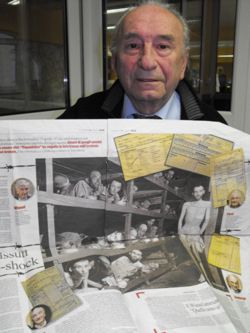by Henry Makow Ph.D., March 13 2009
Nikolaus Gruner, 81, says Elie Wiesel's book "Night" is " 87% a word-for-word plagiarism" of a Yiddish book by Gruner's friend Lazar Wiesel published in Paris in 1956 entitled "... Un di velt hot geshvign," ("The Silence of the World.")
In 1944, Lazar Wiesel, 31, befriended the 15-year- old Gruner in Auschwitz and saved his life more than once. Gruner is in the bottom left-hand corner of the famous Buchenwald photo. Now Gruner is outing Elie Wiesel who he claims stole his friend's identity and work.
"What have they done to my friend Lazar?" Gruner asks. "I want to say kaddish. Where is his grave? Only this man knows. "

Elie Wiesel claims to have authored "Un di velt hot geshvign," in Yiddish and published it in Buenos Aires in Dec. 1955. In 1958 he published a French edition paring the original down from 800 pages. In the Preface to a new edition, Wiesel confessed he had been able "to correct and revise a number of important details." In the first English translation he is said to be "almost fifteen," while in the new edition he is fifteen when he arrived at Auschwitz.
One French professor has remarked that "La Nuit" is totally different from anything else that Elie Wiesel has written" and speculates that Francois Mauriac wrote it.
Gruner has deposited copies of Lazar Wiesel's book in various archives. He says Elie Wiesel and his backers inserted atheist propaganda into the original: The idea that God has turned his back on the world and does not exist. "They used it to destroy the Jewish faith in God."
Gruner says Wiesel distorted some scenes to make them more heartbreaking. Elie Wiesel could not possibly have witnessed women and children being burned alive without this also happening to him.
Gruner resents that Wiesel and his backers have made millions off the holocaust while genuine survivors in old age have nothing to eat. (Wiesel charges $25,000 per lecture and has a tenured university position with a six-figure salary.)
Gruner is publishing a book entitled "Stolen Identity A-7713" in 16 languages and intends to use the proceeds to help his fellow survivors. After the war, Gruner went to Australia and became a successful painter and sculptor. He speaks English with an Australian accent. In 1962, he joined his sister in Sweden where he still lives. He did well manufacturing Hungarian sausages but was put out of business after he exposed Swedish complicity in the holocaust. He married and his wife passed away five years ago.
When Elie Wiesel won the Nobel Peace Prize in 1986, a Swedish newspaper Syd-Svenska Dagbladet contacted Gruner to vouch for Wiesel because both men were in the famous Buchenwald photo. "When I met him, I could see he was an impostor. He claimed to be Lazar but he was not Lazar. He would not show me his tattoo. He had a different birth date. He spoke English with a French accent. He didn't speak Hungarian."
In fact, the man identified as "Elie Wiesel" in the famous photograph is not Wiesel, nor is he Lazar who Gruner says wasn't in the photo. When the Swedish newspaper realized Elie Wiesel was an impostor, they dropped the story like a hot potato, Gruner says.
Gruner began a 20-year research search for his friend traveling throughout Europe and America. He says he found no proof that Elie Wiesel was in any concentration camp. But he did find the book written by his friend Lazar.
"Believe me, I wouldn't try to knock someone of this stature off his pedestal if I weren't 100% sure," Gruner says. "I'm not that kind of person."
Gruner emphasizes that while Wiesel is an impostor, the Holocaust did happen. Lazar Wiesel's original book is authentic. Gruner witnessed events described in it.
Gruner was in Auschwitz (Monowitz) from April 1944 to March 1945. He said four "transports" (cattle trains) carrying 6000 people arrived everyday. The platform had to be cleared in four hours. Roughly half the people -- those who could not work, women, children, the elderly and sick -- were separated and gassed. Gruner lost his mother and younger brother and sister in this way. The SS told the inmates that this was their fate if they didn't work. They said the fires were consuming "the rubbish from the trains" -- his family.
"The only way you will leave here is through a chimney," the SS told the workers who could smell the putrid smoke from their work camp six km away. Gruner weighed 60 lbs on liberation.
"Put me in a room with Bishop Williamson," Gruner says. "I'll teach him a thing or two. Auschwitz was no sanatorium."
Gruner sees the need for a Jewish state. "We need to have our own country," he says. His main beef is that Jewish Reparations Commissions and people like Elie Wiesel are getting rich, while the real survivors are starving in old age. He also wants to do justice to his good friend, Lazar Wiesel....
Elie Wiesel was a member of Menachem Begin's Irgun, but there is no evidence that he was at the Deir Yassin massacre, but he surely would have known of it. Menachem wrote of it in his book, The Revolt:The Story of the Irgun. Menachem Begin went on to receive the Nobel Peace Prize and then went on a savage mass killing assault on Lebanon in 1982; 20,000 Lebanese civilians died in the first two weeks of the aerial bombing of Beirut and the Palestinian refugee camps.
President Reagan's coup de grace on the day after Christmas, 1983, killed-off tens of Lebanese more with the ordering the USS New Jersey to bombard the City of Beirut with its 12 inch guns.
Reagan never got the Nobel Peace Prize, but he did receive Israel's highest honor: The Friend of Zion award....
---
Related: The Original article in Hungarian Newspaper
http://www.henrymakow.com/translated_from_the_hungarian.html







